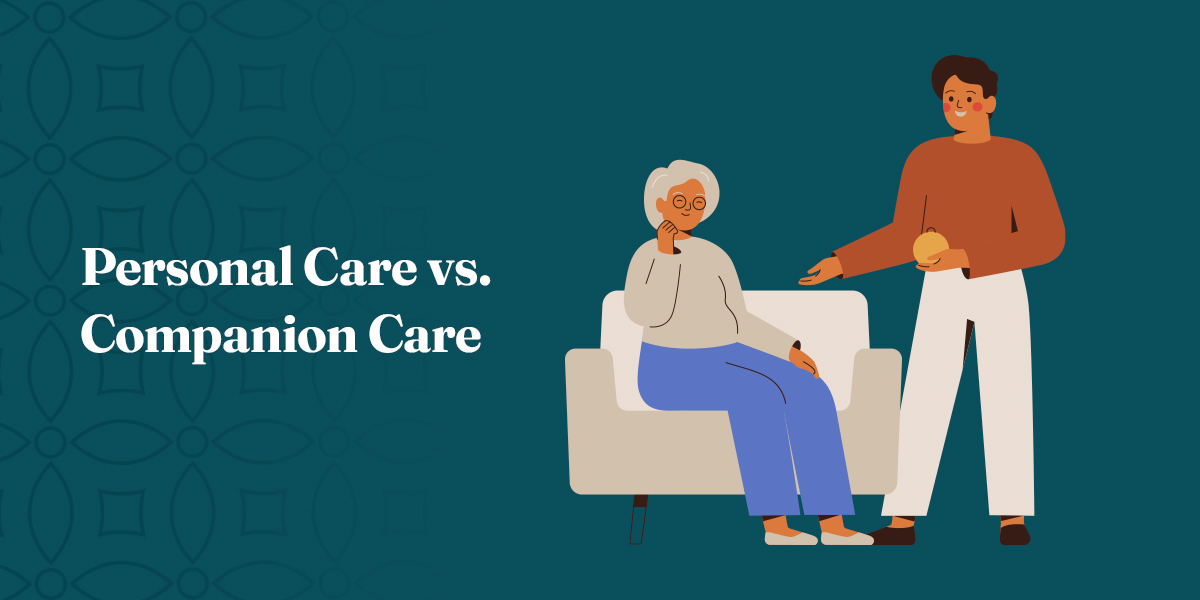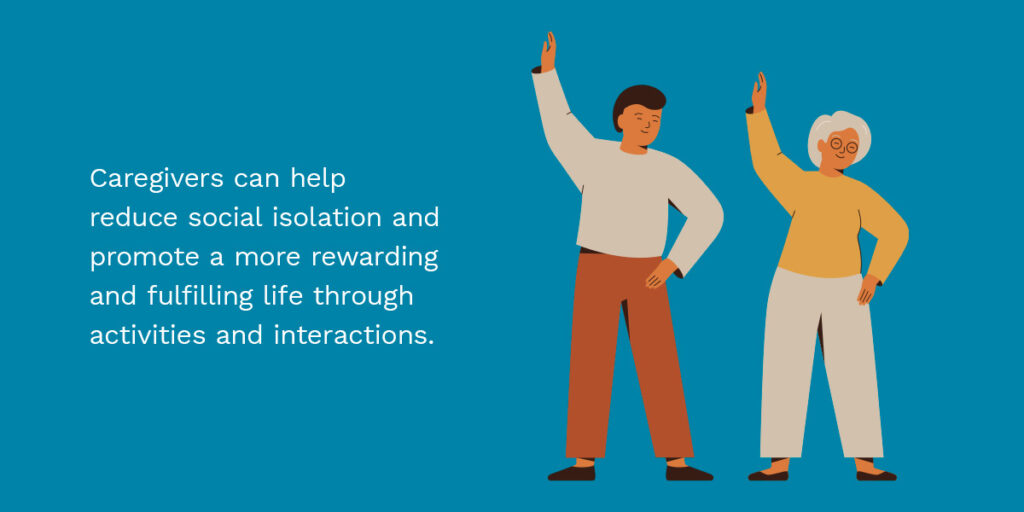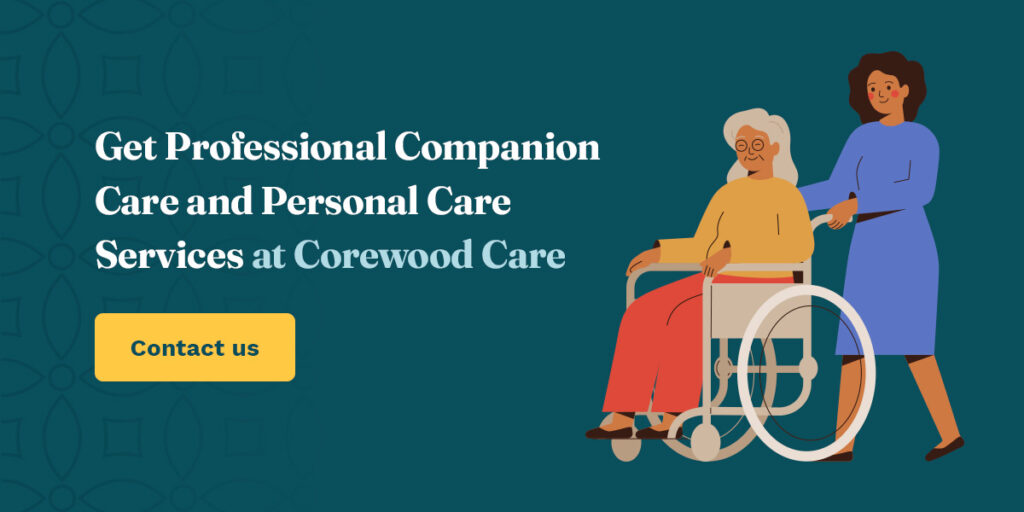Personal Care vs. Companion Care

Founder & CEO

Companion care and personal care are different kinds of in-home caregiving services. While both may seem similar, each provides unique benefits for clients and their families. While companion care focuses on social and emotional support, personal care services focus on personal hands-on assistance. Learning the difference between the two can help families decide what’s right for older adult relatives.
What Is Personal Care?
Personal care services aim to help older adults with activities of daily living (ADLs). Activities of daily living include those a person cannot live without, such as eating, bathing, toileting, walking and dressing. A personal care provider can help older adults function throughout the day and keep them safe.
Clients are given personalized support and undivided attention when they opt for in-home personal care. The caregiver will focus on the client’s needs to help them with ADLs as needed. The goal is to help older adults maintain their independence and have a higher quality of life, as they can receive support from the comfort of their own homes.
What Are Considered Personal Care Services?
Personal care service examples include:
- Toileting: Many older adults may have trouble walking and sitting and require assistance going to the bathroom. Personal caregivers can discreetly provide help in a way that makes the person feel comfortable and safe.
- Bathing: Bathing can become challenging and unsafe for older adults, especially those with physical impairments. Personal caregivers can help older adults feel safe and comfortable while caring for their personal hygiene.
- Dressing: Older adults may face challenges when dressing. Personal caregivers are there to assist clients in putting on their clothing each day while ensuring they have control over their style.
- Mobility and transfer assistance: Personal caregivers can help older adults if they have trouble moving and walking independently. They can help clients navigate the home safely, avoid falls and transfer them from the couch or bed.
- Feeding: Some older adults can have difficulty feeding themselves or eating a balanced meal. Caregivers will offer help with meal preparation, cooking and eating.
- Medications: Personal caregivers can also help older adults remember which medications they should be taking and remind them in taking medicines at the prescribed times.
What Is Companion Care?
Companion care is a home care service providing crucial social and emotional support for older adults. Companion care services aim to help older adults with instrumental activities of daily living (IADLs), which include light housekeeping duties, meal preparation, social engagement, running errands, arranging medical appointments, transportation, depending on the client’s needs. Companion caregivers can help older adults struggling with loneliness, depression or a lack of motivation to improve their quality of life.
Companion caregivers will spend time with the client, talking to them and participating in activities together like drawing, painting or taking walks, depending on the client’s interests. The goal is to keep older adults engaged and satisfied doing what they enjoy most.
What Are Examples of Companion Care Services?

The primary companion care services include:
- Companionship: A companion caregiver’s primary goal is to provide social and emotional support for older adults even when family or friends are unavailable. Caregivers can help reduce social isolation and promote a more rewarding and fulfilling life through activities and interactions. Caregivers can also schedule social outings to help clients interact with the community.
- Light housekeeping: Some older adults have trouble maintaining housekeeping and completing errands. Companion caregivers can help with light housekeeping duties like sweeping or vacuuming, picking up groceries or going to the laundromat.
- Running errands and scheduling appointments: A companion caregiver can accompany older adults on errands and lend a helping hand or can complete the errand for the person. They can assist in scheduling appointments and follow-up appointments and provide older adults with reminders or take notes during the appointment.
- Transportation: Older adults might have trouble driving to and from appointments or cannot navigate public transit alone. That’s where companion care services come in. Caregivers can set up safe transportation for clients to get where they need to safely and on time.
While companion caregivers cannot provide medical assistance, they can keep family members informed on the client’s health and well-being if they have any concerns. Companion caregivers can also call for immediate medical aid in the case of an emergency.
Similarities and Differences Between Personal Care vs. Companion Care
Weighing the similarities and differences between personal and companion care can help families decide which service suits an older adult’s needs. The primary differences lie in the types of services provided. Companion caregivers provide regular social support, while personal caregivers are licensed and trained nursing assistants and offer hands-on care and physical assistance.
Personal care providers are trained and qualified to handle immediate and direct physical assistance. They can also assist older adults with chronic health conditions like dementia or diabetes.
Older adults who need social support can benefit from companion care, which aims to reduce loneliness and isolation. As part of this service, clients can also request help with chores like housekeeping and running errands. Companion caregivers can also keep the client company while helping with everyday tasks like organization or meal prep.
These services are similar in how they are both offered at the client’s home and customized according to their needs and schedule. Companion and personal care services aim to help clients feel more independent, comfortable and satisfied with life.
How to Choose the Right Caregiving Service
Hiring the right caregiver is essential to help older adults maintain independence and live in their homes longer, and to provide extra support when family members can’t physically be with them. Use these tips to choose the right caregiving service:
- Learn and understand the services well: It can be challenging to know what’s best for a family member, but understanding the caregiving services well can ensure they get exactly what they need. Select services that align with their needs and goals.
- Check for alliances and associations: Trustworthy, qualified care professionals ensure their services collaborate with reputed medical institutions. The services provided are based on past proven outcomes and adjusted to improve future ones, ensuring clients get the best care possible.
- Credibility: Ensure the caregiver is licensed or trained to care for older adults. Credible caregivers will be specifically trained to care for medical conditions or provide emotional support as needed. They will also undergo a comprehensive hiring process before being accepted based on their qualifications, skills and overall fit.
Get Professional Companion Care and Personal Care Services at Corewood Care
Everyone’s care needs are different. That’s why you’ll want to consider the various services offered through companion and personal care. While companion care is ideal for clients seeking emotional support, personal care services provide hands-on physical assistance. Both options allow your family member to flourish all in the comfort of their home.
At Corewood Care, we can help you figure out the best service for an older adult in your life. If you’re searching for more extensive home services that include both emotional support and medical assistance, we also provide 24/7 in-home care.
Contact us today to learn more about our services and find a care solution for someone in your life. Provide your information, and we will reach out to assess your needs and schedule a free care assessment.





